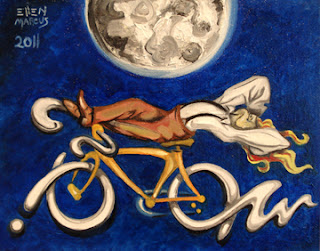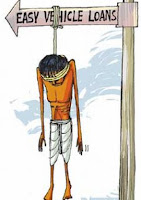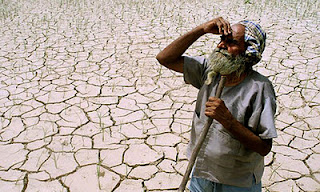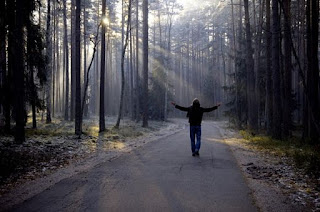 |
| Picture credit: actsofpaint.com |
- George Moore
It was a long long wait indeed. I had waited every night for the past nine years in the hope that he would come to me and complete the narration of his unfinished story. But there was no trace of him coming back and I decided to embark on exploring why he had not returned all these years. It was my first journey to the world of which I knew naught. The far off land from which he would come visiting is the one I had to sail towards. Something in me was telling this would be the journey - the journey which would take me to a destiny awaiting to be fulfilled for years. The optimist in me hoped it would be the journey of the lifetime but the pessimist cautioned not to jump to conclusions and keep expectations limited.
He would come to me in the deep hours of the peaceful childhood slumbers. We do not dream by our choice. This guy was no exception. He frequented into my dreams, always by his own choice and would narrate parts of his life story. A very eccentric guy, I had thought during the initial nights. But as nights passed by, I took a liking to him. He narrated various episodes of his life - childhood, love, pain, ecstasy, success, failure. Not much of it would make sense to me back then, but now his stories do appeal to me. He told me how his passion for cycling had shaped his life. In the tribe he was born, cycling was considered a taboo and his early confrontations with the orthodoxy earned him the tag of a 'rebel'. Fed up being treated an outcast, he chose to cycle his way to the new lands where cycling was a privilege.
Rag-picking his way to being a professional cyclist, his first major heartbreak came when his lady love could not stand the obsession of his passion. Later at the peak of his career, when he felt the burden of competition deprived him of the pleasure of cycling, he had decided to call it off. He had chosen to live, instead of carving a career. The move was one of its kind and had catapulted him into celebrity stardom. He had been elevated to the status of a prophet; adored as the hero of the generation, visionary of the nation and had been hailed as the proponent of the religion of 'cycling for the sake of cycling'. Statues of his were erected in the land and he was called their biggest cultural hero. Living in stardom, as he aged, he had felt the need of an objective listener. No man could be absolutely objective unless in a deep slumber. That was when he wandered into my dreams. For a couple of years he kept coming in my dreams and narrating this story of his, in vivid detail.
I waited eagerly for his arrival. The story of his had an aura, built by his inimitable style of narration. In the penultimate dream he appeared, I had asked him, in childish innocence if he still enjoyed cycling as he did before? He quit the dream without an answer. I was afraid if I had angered him. I was worried if he would ever come back again. He did appear for a very brief span of time, and shared his most cherished wish - "to cycle back home, unfettered". Before I could realize, he walked out of my dream. But I failed to note he was walking out for the last time. I had been waiting for him to appear again, so that I hoped to get a complete picture of his life. But all my hopes went in vain. He had given me only the palate, I was waiting to make sense of the art on the huge canvas. The gentleman never strode into my dreams again.
The journey to his land was a battle on my thought process. How could I meet a huge celebrity of that land? Would he still be interested to share his story with me? Was he dead? I desperately wanted to believe he had not. I don't know how, but I was convinced I could meet him. May be it was just a gut feeling but it was a very strong emotion. As I ventured into his country, it was not anything like what he had described to me. Either I had imagined things in wrong light or the land had undergone a sea of changes. On inquiring, I was told the cyclist prophet could not stand the adulation he received and had abandoned the stardom and cycled back home. They had brought down his statues and rebuilt the land, reinventing themselves after the craze of cycling philosophy had died down.
Not letting the fading hope disappear, I went to his native only to discover he was denied entry there on the ground that he had very long ago dishonored their tradition. He had appealed the rulers of his tribe to reconsider his situation, begged to be pardoned and until a few months back fought for the legitimacy of his entry. When he was about to be pardoned, I was told, he declined the offer and said he had found his true home. A very feeble old man then, the cyclist proclaimed he was fulfilling his most cherished wish and had cycled into the unknown wilderness. None knew where he intended to go and no one had ever seen him again.
All my hopes were lost, dreams shattered. I felt as if destiny had just betrayed me. No one knew where he was. A journey which I hoped would be the finest of all expeditions turned out to be a tragedy? Was I over reacting? None had assured me my goal would be fulfilled. I had not lost anything, but had got to see different lands. Yet I succumbed to the pain and grief of not getting what I had wished for. I realized it was easy to preach equanimity but very hard to live up to it. Disheartened, I returned home.
On seeing me back home, the cyclist said "Here cometh my death to fulfill my destiny."
I cried, "You can't die without completing the story."
"Your arrival completes it."
He collapsed.
I stumbled in the attempt to hold his falling body.
The fall woke me up.
Rag-picking his way to being a professional cyclist, his first major heartbreak came when his lady love could not stand the obsession of his passion. Later at the peak of his career, when he felt the burden of competition deprived him of the pleasure of cycling, he had decided to call it off. He had chosen to live, instead of carving a career. The move was one of its kind and had catapulted him into celebrity stardom. He had been elevated to the status of a prophet; adored as the hero of the generation, visionary of the nation and had been hailed as the proponent of the religion of 'cycling for the sake of cycling'. Statues of his were erected in the land and he was called their biggest cultural hero. Living in stardom, as he aged, he had felt the need of an objective listener. No man could be absolutely objective unless in a deep slumber. That was when he wandered into my dreams. For a couple of years he kept coming in my dreams and narrating this story of his, in vivid detail.
I waited eagerly for his arrival. The story of his had an aura, built by his inimitable style of narration. In the penultimate dream he appeared, I had asked him, in childish innocence if he still enjoyed cycling as he did before? He quit the dream without an answer. I was afraid if I had angered him. I was worried if he would ever come back again. He did appear for a very brief span of time, and shared his most cherished wish - "to cycle back home, unfettered". Before I could realize, he walked out of my dream. But I failed to note he was walking out for the last time. I had been waiting for him to appear again, so that I hoped to get a complete picture of his life. But all my hopes went in vain. He had given me only the palate, I was waiting to make sense of the art on the huge canvas. The gentleman never strode into my dreams again.
The journey to his land was a battle on my thought process. How could I meet a huge celebrity of that land? Would he still be interested to share his story with me? Was he dead? I desperately wanted to believe he had not. I don't know how, but I was convinced I could meet him. May be it was just a gut feeling but it was a very strong emotion. As I ventured into his country, it was not anything like what he had described to me. Either I had imagined things in wrong light or the land had undergone a sea of changes. On inquiring, I was told the cyclist prophet could not stand the adulation he received and had abandoned the stardom and cycled back home. They had brought down his statues and rebuilt the land, reinventing themselves after the craze of cycling philosophy had died down.
Not letting the fading hope disappear, I went to his native only to discover he was denied entry there on the ground that he had very long ago dishonored their tradition. He had appealed the rulers of his tribe to reconsider his situation, begged to be pardoned and until a few months back fought for the legitimacy of his entry. When he was about to be pardoned, I was told, he declined the offer and said he had found his true home. A very feeble old man then, the cyclist proclaimed he was fulfilling his most cherished wish and had cycled into the unknown wilderness. None knew where he intended to go and no one had ever seen him again.
All my hopes were lost, dreams shattered. I felt as if destiny had just betrayed me. No one knew where he was. A journey which I hoped would be the finest of all expeditions turned out to be a tragedy? Was I over reacting? None had assured me my goal would be fulfilled. I had not lost anything, but had got to see different lands. Yet I succumbed to the pain and grief of not getting what I had wished for. I realized it was easy to preach equanimity but very hard to live up to it. Disheartened, I returned home.
On seeing me back home, the cyclist said "Here cometh my death to fulfill my destiny."
I cried, "You can't die without completing the story."
"Your arrival completes it."
He collapsed.
I stumbled in the attempt to hold his falling body.
The fall woke me up.



